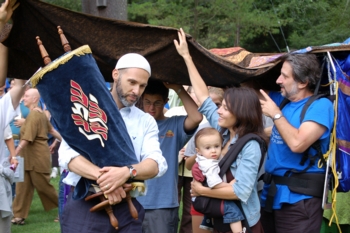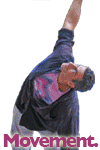 January 07
January 07
Ari Weller is in the Happiness Business
by Rachel Barenblat
p. 2 of 2
That grew, in time, into her wanting to convert to Judaism. At which point I thought, 'Oh shit, the ball's in my court now!' So I went to the bookstore and started to look through these Judaica books. And of course I didn't want to read the traditional ones, I wanted  The Jew in the Lotus, Niles Goldstein, stuff like that. Of course, The Jew in the Lotus involved a lot of stuff about the interaction of Judaism and Buddhism, and I was just blown away. I thought, 'Wow, there's people out there doing this!'
The Jew in the Lotus, Niles Goldstein, stuff like that. Of course, The Jew in the Lotus involved a lot of stuff about the interaction of Judaism and Buddhism, and I was just blown away. I thought, 'Wow, there's people out there doing this!'
RB: Everyone I know who inhabits this corner of the Jewish world has a story like that, of finding the book or the teacher that startled us out of what we thought Judaism was, and into a realization of what Judaism actually can be.
AW: David Ingber and I were both being trained to teach gyrotonic in New York. He was interested in creating an integral Judaism, and he lent me God is a Verb by David Cooper. I read the book, and I was blown open. I thought, maybe some of the answers I was looking for were in a Jewish path. I didn't realize this thought process, this consciousness existed in Judaism. Then a friend accidentally
left a David Cooper CD, Kabbalah 101, at my house. And literally the next day, a catalogue arrived at my house from Elat Chayyim. I'd never heard of the place. And on the second page was a listing for a silent retreat with David Cooper. I thought, 'This is bashert – I have to go to this retreat.'
And that meditation retreat was one of the most profound experiences I've ever had in my life.
At the end of that first retreat, I met Jay [Michaelson] and we started a sitting group together in New York. Somewhere along the way, Jay concocted this idea of Embodied Judaism. 'We can use my Jewish knowledge and your body knowledge and bring a kind of embodied Judaism to Elat Chayyim!' That's how that all unfolded.
RB: Now that you're at Elat Chayyim – given that you initially came to the place as a seeker – what's it like to work there, to be responsible for creating a container for others to have the kind of experience that you had?
AW: I'm standing outside right now, talking to you on the cordless phone – I'm literally 100 feet from the 2 lakes that we have here. I'm looking up at the hills, at the Teva kids working in the distance, and I'm thinking, 'I'm in heaven.' It's such a gift. I'm truly humbled by the position that I have, because I realize how much responsibility is in my hands. And, of course, this is an amazing place to raise my son – knowing he's going to grow up in these surroundings.
In my last job I intermixed the physical, the spiritual, and the business side of things. I was very much a business person at my training business, and that's one of the things my clients liked, that there was an integration, it wasn't just 'he's good with the body but doesn't show up for appointments.' But this – this is what I was seeking and lacking and yearning for in my last job. Integrating the physical and the spiritual in my own practice is great, but I wanted to make a deeper impact on a larger number of people. I'm still in the happiness business, but on a deeper level.
RB: Every time I visit Elat Chayyim I'm a little bit awed by what the residential community creates. What's it like having a son who will grow up in this kind of community?
AW: In the Jewish context we don't see this very often, maybe on a kibbutz, but this kind of intentional community does exist in other contexts, and it was a major part of our decision-making. We kept thinking, 'How cool is this going to be for [my son] Jacob, it's like a village!' There's always somebody there who wants to hold him, to play with him, to laugh with him, sing with him. It's incredible. He's going to be introduced to ideas, to teachers, to ways of being I wish I'd been introduced to a lot earlier! He's going to love it. At least, I hope he is. Maybe he'll say, 'Why'd you leave New York?'
RB: Yeah, just wait until he's twelve or thirteen and jonesing for live music and all-night diners.
AW: He'll be wanting McDonald's and cigarettes.
RB: One of the phrases I see a lot of, when I read about your life and work, is b'tselem elokim – 'in the image of God.' What does that mean to you, what does that evoke for you, how does that tie into the work that you're doing?
AW: That's a tough one. Part of me wants to say, what is not in the image of God? Everything is the image of God. No matter what anyone's work is, what anyone's purpose is, whether you describe it as being in the image of God or Buddha or Vishnu or whatever, it's all ultimately part of this Oneness of everything that is. And what we tried to do in Embodied Judaism is just say, no matter what it is, if everything is part of this Oneness, you can find God in it. So why look any further than the easiest place for you to access, which is the body?
So start there. Start where you are. It was my starting place, so it made sense to me. I didn't realize until things started to fall apart in my own body that I needed to seek deeper health. I think that's the case for most people, when it becomes obvious to them that death is on the near horizon, the body spurs something, a search for divineness.
And that's the work we do here at Elat Chayyim, too. We provide this retreat center, a physical place to try to access something deeper. A place to get away to, to step outside of the proverbial box of your life, put aside your habits, put aside your everyday mind and look deeper to what this can mean, this idea that God is One, God is everything.
We provide the space for people to do the work of answering that question. I don't have an ultimate answer, and I'm fine with that. But I know that we need to step aside from ordinary life in order to answer the question.
Rachel Barenblat is a student in the Aleph rabbinic program. She blogs about Judaism at Velveteen Rabbi









